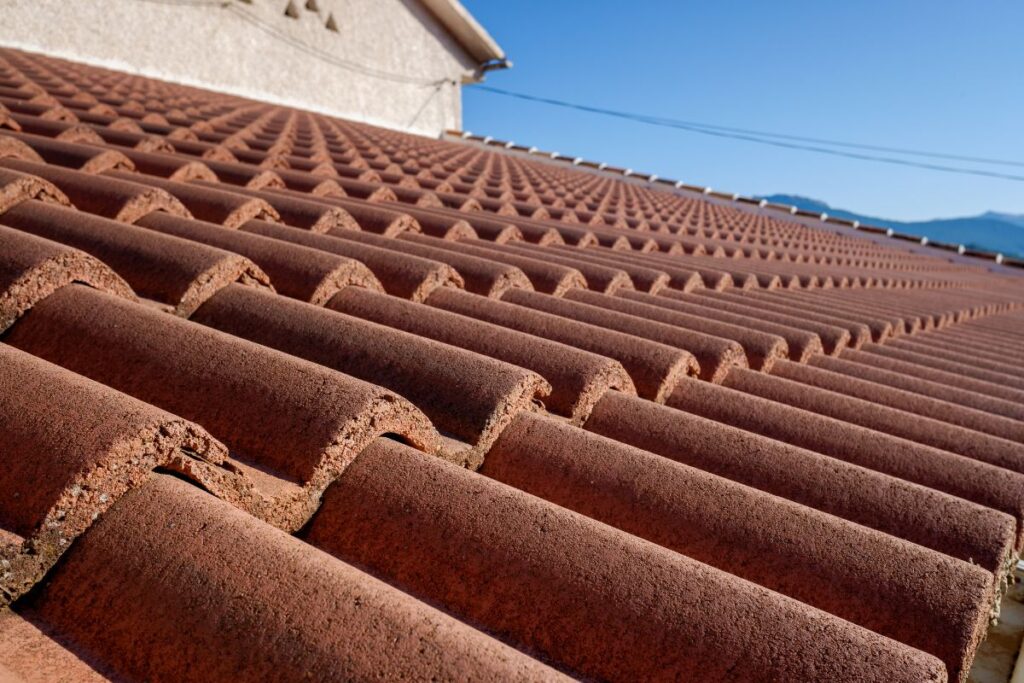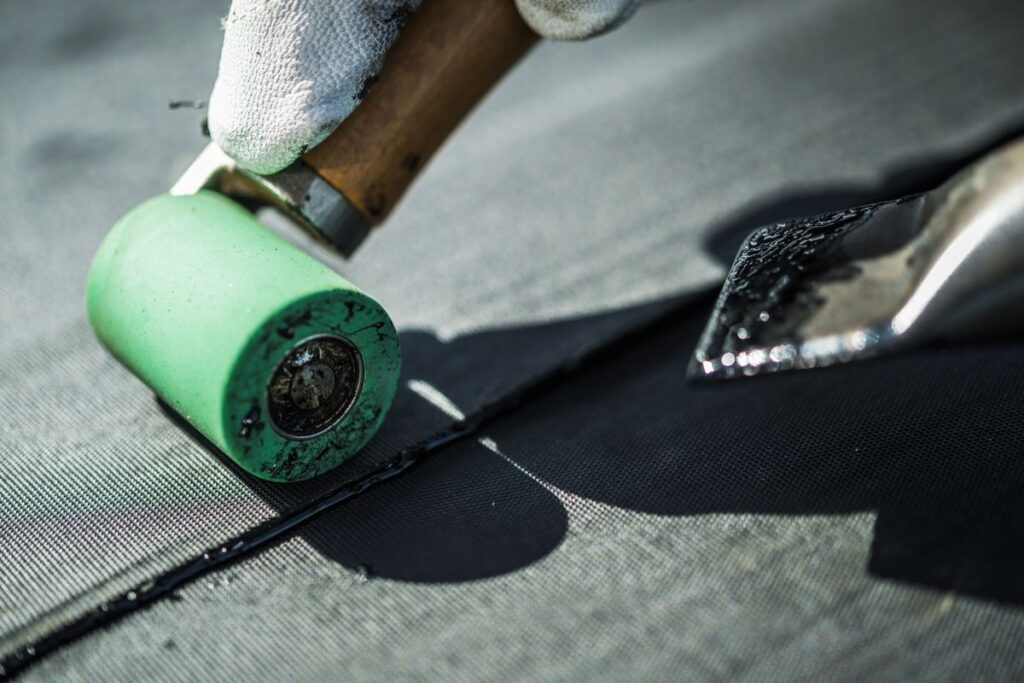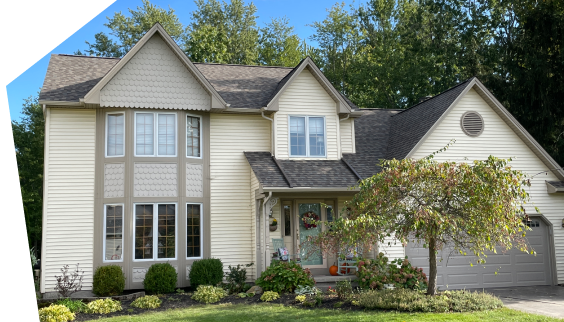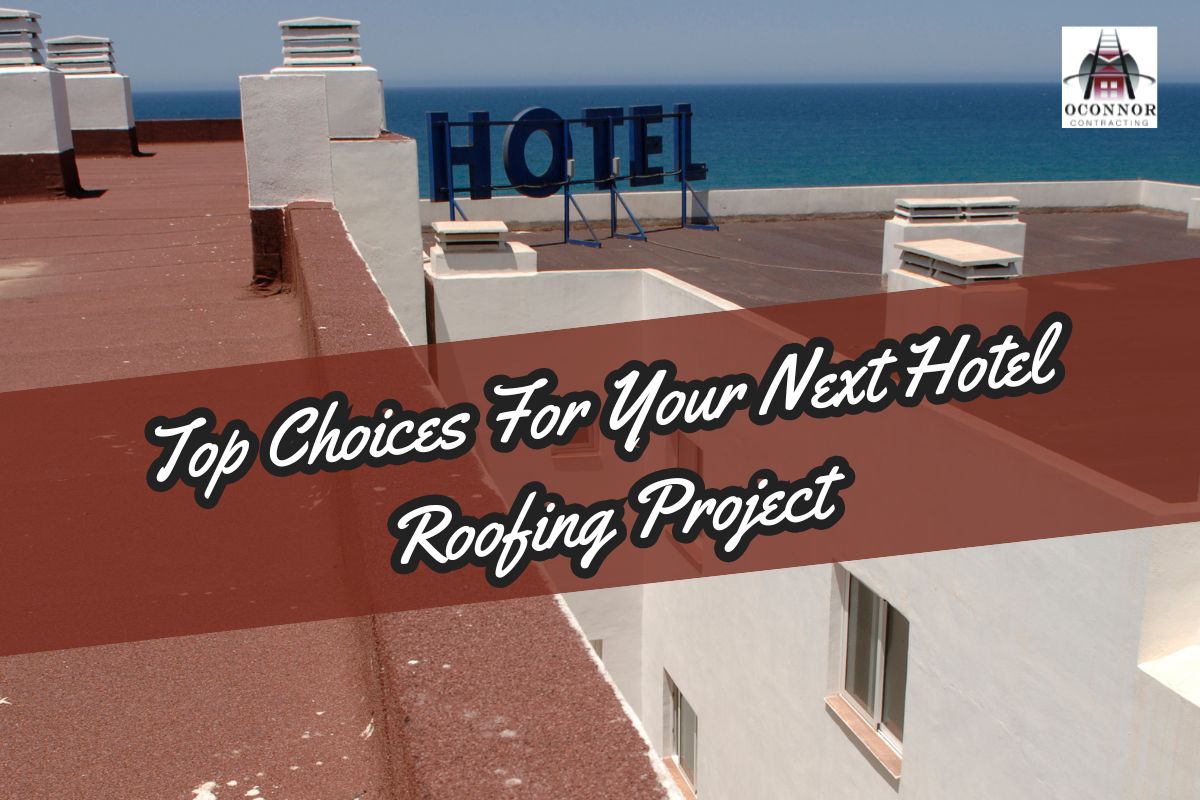Choosing the right roofing material is essential for hotel projects. The roof contributes significantly to a property’s overall aesthetic appeal and energy efficiency, and protects the building and its occupants. However, selecting the best roofing solution for your hotel can be overwhelming with so many options available.
In this extensive blog post, we’ll discuss the best options for your hotel, considering factors like cost, style, durability, and upkeep needs.
5 Best Options For Your Hotel Roofing Needs
Below are some of the best roofing options for hotel roofs that you can go for:
#1. Clay Tiles

Lifespan: 8 to 100 years
Cost: $8 to $15 per square foot
For a long time, clay tiles have been a common choice for hotel roofs because of their weather resistance, durability, and aesthetic appeal. With the proper care, these naturally occurring clay tiles—formed, dried, and fired in a kiln—can last for over a century. They resist fire, hail, and strong winds and give a timeless elegance to any building.
Clay tiles are available in many colors, shapes, and textures. Their innate ability to insulate helps control interior temperature and lower energy expenses. Because they are recyclable, clay tiles are sustainable and require little upkeep. But they are costly, bulky, and brittle, and can only be installed on pitched roofs with a minimum slope of 2.5/12.
- Weather Resistance: Clay tiles resist fire, heavy snow, and torrential rain, ideal for harsh climates.
- Energy Efficiency: The natural insulation of clay tiles helps regulate indoor temperatures and cut energy costs.
- Low Maintenance: Requires minimal upkeep, usually just occasional inspections and cleaning.
- Environmentally Friendly: Made from natural materials and recyclable, clay tiles are sustainable.
- Sound Insulation: Excellent at reducing noise from rain, hail, and other external sources.
- Customization: Can be tailored to match different architectural styles and preferences.
- Resistant to Rot and Insects: Unlike some materials, clay tiles don’t rot or attract insects, ensuring long-term integrity.
#2. Asphalt Shingles

Lifespan: 15 to 30 years
Cost: $4.25 to $8.25 per square foot
The cost-effectiveness, durability, and aesthetic versatility make asphalt shingles an excellent option for pitched hotel roofs. Their low maintenance requirements and ease of installation minimize disruption to hotel activities.
Asphalt shingles are a visually appealing material that can enhance a hotel’s appeal with their various colors, textures, and designs. They are also a practical and durable roofing option for hotels because they deliver dependable protection against weather conditions and last for 20 to 30 years on average.
- Affordability: Asphalt shingles are budget-friendly and popular among building owners on a budget.
- Durability: They protect against wind, rain, and hail and have a decent lifespan.
- Ease of Installation: They are lightweight and easy to install, reducing labor costs and time.
- Low Maintenance: Minimal upkeep is needed and they are easy to repair if damaged.
- Energy Efficiency: Some shingles reflect sunlight, reducing heat absorption and cooling costs.
- Fire Resistance: Certain options have a Class A fire rating for added protection.
- Warranty Options: Shingles often come with warranties, ensuring long-term performance.
- Versatility: Suitable for various roof slopes and shapes, adaptable to different architectural styles.
#3. Metal Roof

Lifespan: 40 to 70 years
Cost: $5 to $20 per square foot
The next option, metal roofs, is also great because of their strength, longevity, and visual appeal. They are perfect for commercial properties like hotels because they provide several advantages and can be used on both flat and pitched roofs. Typically, metal roofs are made from steel, aluminum, copper, or zinc, each with unique qualities and benefits.
Copper roofs have a classic appearance and algae-resistant qualities, while aluminum roofs are lightweight, energy-efficient, and rust-resistant. Zinc roofs are long-lasting and environmentally friendly, and they get their distinctive look from a unique patination process. Steel roofs are strong, reasonably priced, and withstand harsh weather like hail and strong winds.
- Durability: Metal roofs last for more than 50 years and resist cracking, breaking, and eroding, ideal for extreme weather.
- Fire Resistance: Non-combustible with a Class A fire rating, they provide excellent fire protection.
- Lightweight: Lighter than traditional materials, metal panels can lower structural stress and are suitable for new and retrofit projects.
- Variety of Styles: Available in various styles, colors, and finishes, including standing seam, metal tiles, and shingles.
- Energy Efficiency: They reflect solar heat, reducing cooling costs, and often have reflective coatings for better efficiency.
- Low Maintenance: They require minimal upkeep, only occasional inspections and cleaning, and are resistant to mold, mildew, and pests.
#4. PVC Roofing Membrane

Lifespan: 30+ years
Cost: $3 to $10 per square foot
Due to its flexibility, resilience to weather, and durability, PVC (polyvinyl chloride) has become a popular choice for hotels with flat roofs in recent years. This material offers dependable protection and durability, making it ideal for commercial buildings like hotels.
Installed as a single-ply system, PVC roofing membranes are made of a plastic compound reinforced with polyester or fiberglass for additional strength and stability. This installation technique applies the membrane straight to the roof deck, resulting in a seamless, waterproof surface that keeps the hotel safe and leak-free.
- Durability: PVC roofing membranes resist weathering, UV radiation, and chemicals, ensuring tear resistance and longevity.
- Flexibility: When installing PVC roofing membranes on intricately shaped roofs, they flex without breaking, allowing for thermal expansion and building movement.
- Fire Resistance: PVC roofing membranes self-extinguish, meeting fire safety standards and enhancing a building’s fire rating.
- Energy Efficiency: Highly reflective PVC roofing membranes reduce heat absorption, meeting ENERGY STAR standards.
- Easy Installation: Lightweight and manageable, PVC roofing membranes are installed easily with heat welding or adhesive bonding for solid seams.
- Low Maintenance: Resistant to mold and mildew, PVC roofing membranes require minimal upkeep, reducing cleaning needs.
#5. EPDM Roofing Membrane

Lifespan: 30 to 50 years
Cost: $4 to $12 per square foot
The final option on our list, EPDM (ethylene propylene diene monomer), is an excellent option for hotel roofing systems because of its longevity and flexibility—especially for flat and low-slope roofs. This synthetic rubber membrane is appropriate for various climates due to its high resistance to ozone, UV radiation, and weathering.
Large sheets of EPDM membranes are installed to minimize seams and possible leakage points. The material reduces long-term costs because it is lightweight, simple to install, and requires little upkeep. Furthermore, because EPDM can be recycled at the end of its useful life, it is environmentally friendly. All things considered, EPDM offers hotels an affordable, dependable, and weatherproof roofing option.
- Durability and Longevity: Resistant to UV rays, ozone, and impacts, with a life expectancy of at least a few decades.
- Flexibility and Temperature Resistance: Remains flexible in both low and high temperatures, suitable for extreme weather without cracking.
- Easy Installation: It is lightweight, easy to install, ideal for DIY or professional use, and applicable to most existing roofs.
- Waterproofing and Maintenance: 100% waterproof with minimal maintenance needed other than regular inspections to ensure effectiveness.
- Thermal Efficiency: White EPDM is up to 80 degrees cooler than black and has good insulation properties, saving energy in air-conditioned buildings.
- Versatility: Suitable for various buildings and applications, including flat and low-sloped roofs.
Why Is Choosing The Right Roofing Material Important For Hotels?
For a hotel, selecting the right roofing material is essential because it directly affects the guests’ experience. As the first line of defense against the weather, the roof keeps interiors dry and makes sure guests have a comfortable stay. A well-built, well-insulated roof improves guest comfort by reducing noise disturbances from hail, rain, and other sources, promoting restful sleep.
The roofing material also has an aesthetic impact on the hotel’s character and visual allure. It improves curb appeal and harmonizes with the brand identity to create a welcoming atmosphere. Furthermore, the material used for the roof must be both durable and safe. A strong, fire-resistant roof protects visitors and their belongings, promoting a sense of security and well-being that can result in a positive impact.
Looking For The Best Hotel Roofing Company?
A thoughtfully chosen hotel roofing system enhances your business’ long-term sustainability and overall guest experience while safeguarding your investment. Take your time and carefully consider your options before deciding on a roof that fits your project’s budget and objectives.
To get the best hotel roofing services, choose OConnor Contracting. Our team of roofers guarantees long-lasting, effective repairs and replacements that improve comfort and safety while shielding your hotel from the weather. For the best commercial roof repair services, call us at (716) 600-7663.


